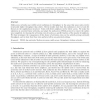Free Online Productivity Tools
i2Speak
i2Symbol
i2OCR
iTex2Img
iWeb2Print
iWeb2Shot
i2Type
iPdf2Split
iPdf2Merge
i2Bopomofo
i2Arabic
i2Style
i2Image
i2PDF
iLatex2Rtf
Sci2ools
CORR
2010
Springer
2010
Springer
Spatial fairness in linear wireless multi-access networks
Multi-access networks may exhibit severe unfairness in throughput, in the sense that some nodes receive structurally higher throughput than others. Recent studies show that this unfairness is due to local differences in the neighborhood structure: Nodes with fewer neighbors receive better access. We study the unfairness in saturated linear networks, and adapt the multi-access CSMA protocol to remove the unfairness completely, by choosing the activation rates of nodes as a specific function of the number of neighbors. We then investigate the consequences of this choice of activation rates on the network-average saturated throughput, and we show that these rates perform well in non-saturated settings.
Related Content
| Added | 14 May 2011 |
| Updated | 14 May 2011 |
| Type | Journal |
| Year | 2010 |
| Where | CORR |
| Authors | Peter M. van de Ven, J. S. H. van Leeuwaarden, Dee Denteneer, A. J. E. M. Janssen |
Comments (0)

